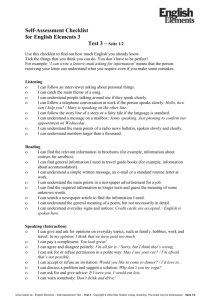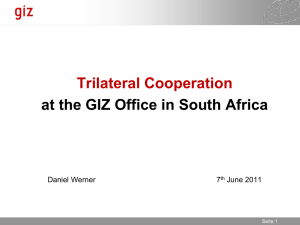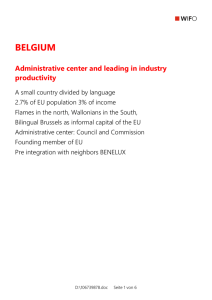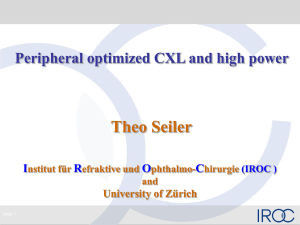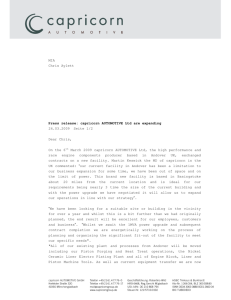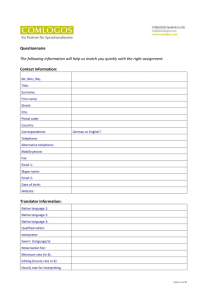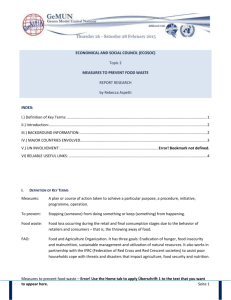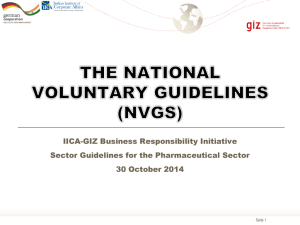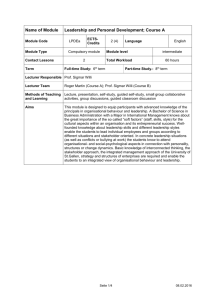violence against women - Zonta Andalucia Málaga
advertisement
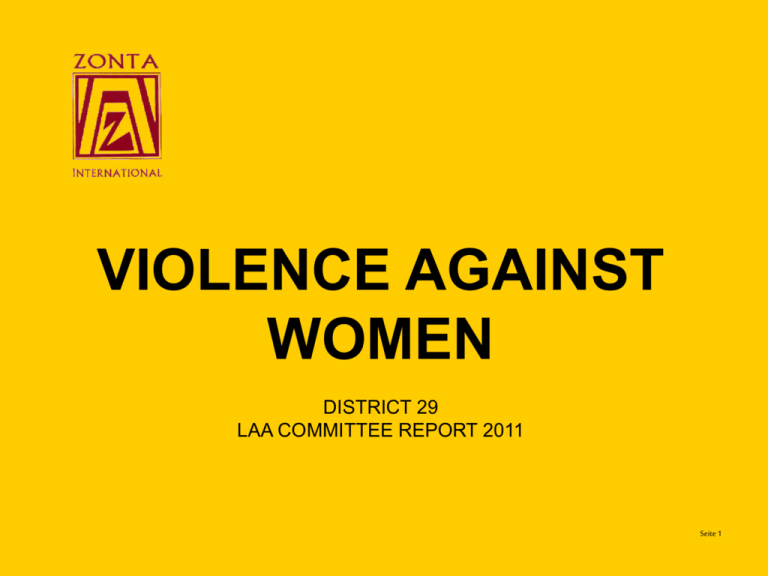
VIOLENCE AGAINST WOMEN DISTRICT 29 LAA COMMITTEE REPORT 2011 Seite 1 LAA COMMITTEE JUDITH ELTENBERG ZC ROTTERDAM INES CHAMARRO STORMS ZC MADRID KM 0 GUDRUN ENGELS ZC ESSEN ANNA HUMMEL ZC GUILDFORD GUILAINE RICHEFORT ZC TOURS OLGA ROLLE ZC ST PETERSBURG Seite 2 VIOLENCE AGAINST WOMEN: A DEFINITION “Violence against women is a manifestation of historically unequal power relationships between men and women.” “Violence against women is one of the crucial social mechanisms by which women are forced into a subordinate position compared with men.” (UN Declaration on the Elimination of VAW) Seite 3 SOME FIGURES Seite 4 SOME FIGURES In Russia over 14,000 women are estimated to die every year at the hands of a partner or family member Seite 5 SOME FIGURES (2) In the United Kingdom 50% of murdered women are killed by a partner (vs only 5% of murdered men) Seite 6 SOME FIGURES (3) 20-25% of German women will suffer physical or sexual violence during their lifetime Seite 7 SOME FIGURES (4) France registered 650,000 complaints of sexual violence in 2009 Seite 8 SOME FIGURES (5) In Spain only 8.5% of VAW procedures are started by the victim Over 90% of VAW cases are reported by doctors or police Seite 9 SOME FIGURES (6) In The Netherlands 60% of the victims of domestic violence is women In 2010 14 women got killed as a result of domestic violence Seite 10 INTERNATIONAL RESPONSE 1) UNITED NATIONS Seite 11 UNITED NATIONS 1975 International Women's Year : First World Conference on Women held in Vienna The process begins to bring women into decision-making at all levels 1995 Fourth World Conference on Women held in Beijing VAW is named as one out of 12 “critical areas of concern” in the situation of women around the world Seite 12 UNITED NATIONS (2) Definition of VAW (Beijing Conference) Any act of gender-based violence that results in, or is likely to result in, physical, sexual or psychological harm or suffering to women, including threats of such acts, coercion or arbitrary deprivation of liberty, whether occurring in public or private life. Seite 13 UNITED NATIONS (3) Accordingly, VAW encompasses (but is not limited to) the following: Physical, sexual and psychological violence occurring in the family, including battering sexual abuse of female children dowry-related violence marital rape female genital mutilation Seite 14 UNITED NATIONS (4) Physical, sexual and psychological violence occurring within the general community, including rape sexual abuse sexual harassment intimidation at work, in educational institutions and elsewhere trafficking in women forced prostitution Seite 15 UNITED NATIONS (4) Physical, sexual and psychological violence perpetrated or condoned by the State, wherever it occurs. Violation of the human rights of women in situations of armed conflict, in particular: murder systematic rape sexual slavery forced pregnancy. Seite 16 UNITED NATIONS (5) Reproductive violence: Forced sterilization Forced abortion coercive/forced use of contraceptives female infanticide prenatal sex selection. Seite 17 INTERNATIONAL RESPONSE 2) EUROPEAN UNION Seite 18 EUROPEAN UNION In Europe The elimination of VAW is a priority area of the European Commission, expressed through the Women’s Charter adopted in March 2010 and The Strategy for equality between women and men adopted in September 2010. The European Union promotes the erradication of VAW through funding support awareness-raising activities the promotion of exchanges of good practices. Seite 19 NATIONAL RESPONSES 1) HOW COUNTRIES DEFINE VAW (CRIMINAL CODES) Seite 20 SPAIN NETHERL. GERMANY FRANCE UNITED KINGDOM RUSSIAN FED. •Homicide •Rape •Sexual abuse •Mutilation •Lesser violence Administrati ve offence •Threats/Abuse ? •Sex. Harassment Honour-related VAW ? Reproductive ? TYPE OF VIOLENCE Physical Psychological Seite 21 SPAIN NETHERL. GERMANY FRANCE UNITED KINGDOM RUSSIAN FED. Women trafficking Forced prostitution ? Forced marriage ? N/A ? TYPE OF VIOLENCE Dowry-related VAW Seite 22 NATIONAL RESPONSES 2) NATIONAL LEGISLATION Seite 23 NATIONAL LEGISLATION First wave: the 70s United Kingdom 1971 1976 First Refuge Act Domestic Violence Bill Spain 1978 Constitution: equality, right to life and physical and moral integrity Seite 24 NATIONAL LEGISLATION (2) Second wave: the 90s Spain 1995 Penal Code Law for assistance to victims of violence and sexual crimes Germany 1996 Wohnungsverweisung und Rückkehrverbot zum Schutz vor häuslicher Gewalt” United Kingdom 1996 1997 Family Law Act Sex Offenders Act Seite 25 NATIONAL LEGISLATION (3) Third wave: the 2000s Germany 2002 Protection from Violence Act (“Gewaltschutzgesetz“) 2005 Gesetzliches Verbot der Zwangsehe in § 240 (Nötigung) Spain 2003 2003 2004 Law on protection of victims of domestic violence Amendment of Penal Code Gender Violence Law Netherlands 2003 Domestic Violence Decree (Aanwijzing Huiselijk Geweld) 2009 Law for Temporary Restraining Order (Wet Tijdelijk Huisverbod) Seite 26 NATIONAL LEGISLATION (4) United Kingdom 2004 Crimes and Victims Act France 2004 2006 2007 2010 2011 Eviction of the violent partner in case of divorce Aggravation of violence committed by non-married and ex-partners Law allowing psychological treatment of violent partners Law against Family Violence 1st interministerial Plan against VAW (2011-2013) Seite 27 NATIONAL LEGISLATION (5) Special case: the Russian Federation The Russian Federation lacks a law specifically prohibiting domestic violence. • The Criminal Code prohibits rape and sexual assault in general terms. • Less serious VAW incidents are treated as administrative violations. Russian law does not specifically prohibit sexual harassment. The Criminal Code prohibits (since 2003) human trafficking and the use of slave labor, but there is no comprehensive program to prevent human trafficking. Seite 28 HOW THE LEGISLATION WORKS IN REAL LIFE Seite 29 TWO VOICES Seite 30 PROCEDURE AND VICTIM RIGHTS IN THE EUROPEAN UNION Seite 31 PROCEDURE AND VICTIM RIGHTS 1) Victim suffers violence The victim can report the violence to the police or to the courts Police or doctors intervening may also report the case to the courts The case then goes ahead whether the victim presses charges or not Exception: in France the victim must press charges or the case is dropped. Important: in physical violence evidence must be preserved (medical certificate, pictures taken by police, etc.) Seite 32 PROCEDURE AND VICTIM RIGHTS (2) 2) Interim measures An order forbidding the aggressor to approach the victim may be issued in the Netherlands: by the mayor in Germany: by the police other countries: by the court Other possible measures: Temporary custody (rare) Aggressor banned from home Electronic tagging Seite 33 PROCEDURE AND VICTIM RIGHTS (3) 3) Help to victims Given by the State, social services or specialized associations: Legal advice (free if victim is without means) Women’s shelters (if victim flees from aggressor) Medical and psychological care Preference for social housing (Spain/Netherlands) Economic help (Spain) Retraining programs to allow the victim access to employment (Spain) Labour rights (change work center or work times, etc.) (Spain) Seite 34 PROCEDURE AND VICTIM RIGHTS (4) 4) Court procedure After investigation the violence will be tried by a specialized penal court and the aggressor condemned to either Imprisonment (rare) Community work/Violence prevention courses Fine A civil procedure may occur simultaneously to decide Indemnification to victim Divorce Children custody and alimony provisions Seite 35 PROCEDURE AND VICTIM RIGHTS (5) Problems: Most reported cases are physical violence. Psychological violence is rarely punished because unreported. The victim is usually the main witness. If the victim does not press charges or refuses to testify the case often collapses. % of victims filing for divorce is small (10-15% in Spain). Therefore most go back to living with the aggressor. Courts and public prosecutors are not consistent in their behaviour in application of the laws, leading to insecurity for victims. Seite 36 WHY DOES ALL THIS HAPPEN? THEORIES AND MISCONCEPTIONS Seite 37 MISCONCEPTIONS • Men who batter women are mentally ill • Violence is a loss of control problem • “Learned helplessness” Battered women accept the situation and do not defend themselves • “Family conflict” model Both partners contribute to the violence Seite 38 CURRENT UNDERSTANDING VAW is a learned behavior that a male engages in to establish and maintain power and control over his partner. Violence is learned through exposure to social values and beliefs regarding the appropriate roles of men and women. Violent behavior is reinforced when peers and authorities fail to sanction batterers for using violence. Seite 39 CURRENT UNDERSTANDING (2) It is critical that all members of a community share a common understanding about VAW and its causes. Therefore education should be a primary concern: Awareness-raising in the general population through media campaigns Education throughout school and university Training for intervening professionals Seite 40 WHAT CAN ZONTA DO? Seite 41 ZONTA INTERNATIONAL ZISVAW Program • Supports prevention and advocacy strategies locally and internationally. • Awards grants to United Nations agencies or recognized NGOs for projects that seek to change personal and/or political knowledge, attitudes and behavior contributing to gender-based violence. • More than $2 million donated since 1999 Increases awareness and actions related to preventing violence against women by encouraging Zonta club involvement in local and national advocacy initiatives and service projects. Seite 42 Zonta District 29: Area directors’ reports Seite 43 LAA OPPORTUNITIES Seite 44 LAA OPPORTUNITIES Legal awareness • means educating yourself about the ‘division of powers’ in your country – that is, what each level of government is responsible for • know the process by which laws are created at the local, regional and national level of government • know how to have laws repealed or changed, how to prepare submissions for parliamentary inquiries or reviews, and how to present a logical, comprehensive case to support your views/arguments for or against it Seite 45 LAA: DISTRICT LEVEL The District 29 LAA Committee tries its best to contribute to law awareness throughout the District: Newsletters Reports Lectures to Area and Club meetings Clubs should also appoint their own LAA committees in order to keep up to date with legal developments in your country Seite 46 Advocacy Advocacy is the expression of support for or opposition to a cause, argument or proposal. Advocacy may include influencing laws, legislation or attitudes. Seite 47 Advocacy Plan your advocacy activity: • Choose an issue that promotes the status of women - education health - legal social - economic human rights • Use the SCORE CARD and the Advocacy Framework which links Zonta’s Objects to CEDAW Articles (See ZI Website – LAA page) • Ensure that the Club/District is in agreement about the issue as one suitable for Zonta advocacy Seite 48 Advocacy (2) • Know your issue (high level of expertise required) • Establish your objectives • Conduct a stakeholder analysis to identify opposition • Develop a strategy • Identify and mobilise required resources • Monitor and evaluate the progress • Avoid conflicts of interest at all times • Conduct advocacy in an ethical manner Seite 49 Advocacy (3) And remember: • no-one other than the International President/International Board can sign on behalf of Zonta International • Club Presidents can only sign on behalf of club if a motion is passed by a majority of members at a club meeting. (Club Boards of Directors cannot make policy/pass motions or take action binding a club). • On advocacy matters to be decided by the club, advance notice of discussion should be given (agenda items) and any papers distributed to all members before any vote is taken. • Governors, clubs, individuals should only advocate on matters pertaining to their own jurisdictions. Concerns re matters in other countries should be referred to the Chairman of the United Nations Committee. Seite 50 LEGISLATIVE AWARENESS & ADVOCACY Seite 51 THANK YOU
